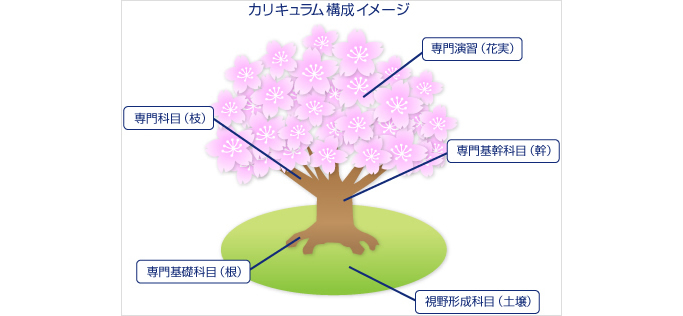Integrated learning from introductory education to specialized education
As shown in the image of the curriculum structure, the Faculty of Sports and Health Studies aims to provide all students who enroll in the Faculty of Sports and Health Studies with a solid root and trunk based on the foundation of physical education and health studies on the soil based on rich human development, so that they can spend their four years to bear their own unique flowers and fruits on distinctive branches that match their interests and concerns. The curriculum is structured in such a way that students can spend four years developing their own unique flowers and fruits on distinctive branches that match their interests and concerns.

Vision Formation Subjects
The curriculum offers a wide range of subjects that will serve as a foundation for students of the Faculty, from subjects in the humanities and social sciences, such as "Humanity and Sports" and "Bioethics," to subjects in the natural sciences, such as "Statistics" and "Information Literacy.
In addition, "Introduction to Sports and Health Studies," which is required for first-year students, helps students acquire the ability to adapt to university life.
Fundamental Specialty Courses
As a prerequisite for taking specialized courses, a wide range of subjects are offered, from "Physiology" and "Functional Anatomy A," which are the foundation of physical education and health science, to "Philosophy of Sport" and "Sport Management," so that students can learn about the relationship between health science and society.
Core Specialty Courses
The courses are designed so that students can learn interdisciplinary areas without being biased toward a single course.
Specialty Courses
The Health Design Course, the Sports Business Course, and the Sports Coaching Course are offered, and students can study each course in connection with each other. For a description of each course, please refer to the "Course Introduction" page.
Specialized Exercises
Students will acquire advanced problem-solving skills by learning how to deal with specific problems based on a compilation of theoretical knowledge acquired in the three course subjects. In principle, each seminar consists of approximately 10 students per grade level, and through small-group discussions and presentations, students can acquire an attitude of putting the theories they have learned into practice as their own.
Curriculum Map and Curriculum Tree (for students entering in 2023 or later)
Appropriate amount of subjects and generous support system
By narrowing down the subjects necessary for studying sports health and clearly indicating the course model, students are able to fully understand the contents of the subjects and to be aware of their future career development.
In addition, elective courses are offered in small classes to stimulate students' motivation for sustained learning and to ensure that they are supported by the faculty members in charge of the courses.
Advanced English language skills can be developed
Courses that enable students to acquire the English language skills necessary to understand the cutting-edge education and research in the Faculty of Sports and Health Studies include "General English," "English Communication," and "Health and Exercise Sciences. By taking these English courses, students can develop the ability to understand the latest research results in specialized subjects in their original language and the ability to practice sports business overseas.
The school also has a cafeteria that students can freely use, as well as an information laboratory for self-study of languages.
Cooperation among courses and linkage from basic to specialized courses
A group of subjects common to all courses has been established to ensure that all students acquire basic knowledge of physical education and health science, which is the foundation of "sports health studies". The subjects that form the basis of physical education and health science are also introductory subjects that develop into specialized subjects in each course, and are subjects that develop learning from the basics to the applications.
Students will be able to select appropriate courses in accordance with their own interests and future career development, and will also be able to acquire sufficient basic knowledge of subjects other than the course they intend to choose, thereby acquiring a broad perspective.
A well-developed learning and research environment that emphasizes practical skills and training and makes use of the latest equipment
Clinical measurements and experiments are essential for scientific analysis related to health management and athletic performance improvement, and our well-developed education and research system and experimental facilities provide an adequate environment to address these issues. In addition, as a practical training site, we will improve the qualities of students who aim to become trainers in the future through conditioning of our athletics students, who are among the top athletes in the nation.
In addition to lectures, fieldwork is also important for improving coaching skills and acquiring knowledge of the sports business, and students will use the artificial turf courts in the Faculty of Sports and Health Studies building and various other physical education facilities to teach local residents and develop practical coaching skills. In addition, students can acquire "sports health studies" as a practical learning experience through specialized exercise courses in fields such as sports media and sports marketing, sometimes at facilities outside of the university.

